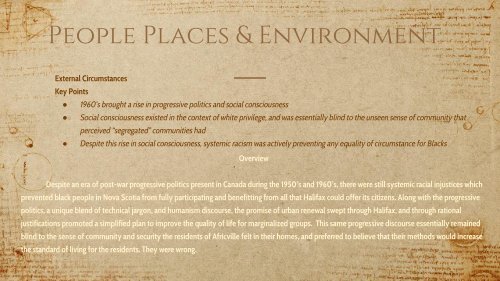Significant Event
You also want an ePaper? Increase the reach of your titles
YUMPU automatically turns print PDFs into web optimized ePapers that Google loves.
People Places & Environment<br />
●<br />
External Circumstances<br />
Key Points<br />
● 1960’s brought a rise in progressive politics and social consciousness<br />
● Social consciousness existed in the context of white privilege, and was essentially blind to the unseen sense of community that<br />
perceived “segregated” communities had<br />
● Despite this rise in social consciousness, systemic racism was actively preventing any equality of circumstance for Blacks<br />
Overview<br />
Despite an era of post-war progressive politics present in Canada during the 1950’s and 1960’s, there were still systemic racial injustices which<br />
prevented black people in Nova Scotia from fully participating and benefitting from all that Halifax could offer its citizens. Along with the progressive<br />
politics, a unique blend of technical jargon, and humanism discourse, the promise of urban renewal swept through Halifax, and through rational<br />
justifications promoted a simplified plan to improve the quality of life for marginalized groups. This same progressive discourse essentially remained<br />
blind to the sense of community and security the residents of Africville felt in their homes, and preferred to believe that their methods would increase<br />
the standard of living for the residents. They were wrong.


